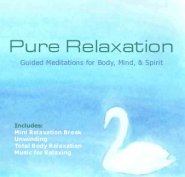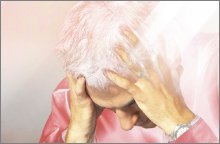|
|

|

Depression: Some Astounding Statistics and What You
Should do if You or a Loved One is Confronting It
by www.SixWise.com
Americans are becoming increasingly depressed, and have been since at least the
1950s. Back in 1905, for instance, just 1 percent of Americans suffered from depression
by age 75. Fast-forward to 1955, and 6 percent were depressed -- by the age of 24,
according to research by Dr. Myrna Weissman of the New York State Psychiatric Institute.
|

Women are twice as likely as men to experience depression, likely because of hormonal
factors.
|
Meanwhile, a past study published in the Journal of the American Medical Association
found some revealing statistics. A study of over 39,000 people in several countries,
including the United States, found that each successive generation was more likely
to experience major depression at an earlier age, and a greater number of people
overall experienced at least one episode of severe depression.
Today, 9.5 percent of the U.S. population, nearly 30 million adults, suffers from
depression in any given yearlong period, according to the National Institute of
Mental Health (NIMH).
Why Are People Becoming More Depressed?
It seems that, across the board, depression is impacting millions.
-
15 percent of the elderly experience depression at some point, and the NIMH calls
this a "serious public health concern."
-
2 percent of school-aged children and 5 percent to 8 percent of adolescents suffer
from depression, according to a study in American Family Physician.
-
15 percent of college students said they'd been diagnosed with depression in 2004,
up from 10 percent in 2000, according to the American College Health Association's
National College Health Assessment (ACHA-NCHA).
|

Stressful events happen to all of us, but you don't have to let them dampen your
spirits. The
Pure Relaxation CD will calm your mind, soothe your emotions and create
a state of deep relaxation in your body. Using these guided meditations regularly
will help you to live in a more relaxed way.
|
Theories as to what's causing all of this depression -- a laundry-list of symptoms
that impact your ability to function in daily life for weeks, months and even years
at a time -- are varied. While some say the rising rates are simply an artifact
of greater awareness and diagnoses, most believe something larger is at play.
"Some part of the trend may be due to better identification of depression in
more recent years, but we've ruled out greater accuracy in diagnosis as being the
major explanation," said Dr. Weissman in a New York Times article.
One thing's for sure, depression is often the result of a variety of physical, emotional
and environmental triggers, which include:
-
Stress
-
Genetics/family history
-
Erosion of the nuclear family (increasing divorce rates, families moving
apart, parents working longer hours).
-
Stress early in life, which can impact the development of neurons and predispose
you to depression when you're under stress later in life
-
Greater focus on individuality, and less focus on family and community (which means
you have less support to fall back on during times of hardship)
-
Among women, who experience depression about twice as often as men,
hormonal factors, such as
menstrual cycle changes, pregnancy, miscarriage, childbirth and the
postpartum period, pre-menopause, and menopause, may contribute
-
Environmental
chemical pollutants in your air, home, water, food, etc.
-
Certain medications, such as sleeping pills, high blood pressure medication and
birth control pills
|
Common Symptoms of
Depression to Watch For

People with depression often face some or all of the following symptoms, according
to the National Institute of Mental Health.
-
Persistent sad, anxious, or "empty" mood
-
Feelings of hopelessness, pessimism
-
Feelings of guilt, worthlessness, helplessness
-
Loss of interest or pleasure in hobbies and activities that were once enjoyed, including
sex
-
Decreased energy, fatigue, being "slowed down"
-
Difficulty concentrating, remembering, making decisions
-
Insomnia, early-morning awakening, or oversleeping
-
Appetite and/or weight loss or overeating and weight gain
-
Thoughts of death or suicide; suicide attempts
-
Restlessness, irritability
-
Persistent physical symptoms that do not respond to treatment, such as headaches,
digestive disorders, and chronic pain
|
If You or a Loved One are Depressed, Here's What to Do
Medications are available for depression, but they do have
side effects. Antidepressant drugs have been linked to an increase in suicidal
thoughts and behavior in children, teens and young adults, and among adults may
cause insomnia, sexual problems, nausea, agitation and more.
That said, it's important for anyone facing depression to get help, as, left untreated,
depression can lead to a loss of independence, disability and
suicide . Here are several options to help those in need:
-
Therapy: This can come from a psychiatrist, psychologist, group therapy class
and other support groups, and can help you resolve issues that are causing you stress,
sadness, anxiety and fear.
-
Bright Light Therapy: Some studies have found that exposure to bright light
can suppress the production of melatonin, which may depress mood if levels are too
high. Spending some time in the sun may also help.
-
Exercise: Studies show exercise is incredibly effective at easing the symptoms
of depression.
-
Eat a healthy diet. This supports your body from a physical perspective,
which can translate to a better mood overall.
-
Surround yourself with friends and loved ones. Try not to spend too much
time isolated, and feel free to share your feelings with people close to you.
-
Avoid alcohol and drugs, which can actually worsen your symptoms.
-
Try different forms of stress relief to help you relax, such as meditation,
yoga and
listening to music or a relaxation CD, such as
Pure Relaxation.
Recommended Reading
Effective Ways to Deal with Sadness and Grief, Part 1
Drugs with Potentially Psychotic Side Effects: Which Ones are They (& Who Deserves
to Know)?
Sources
National Institute of Mental Health
American Family
Physician November 15, 2000
The New York Times December 8, 1992
Medical
News Today
To get more information about this and other highly important topics, sign up for your free subscription to our weekly SixWise.com "Be Safe, Live Long & Prosper" e-newsletter.
With every issue of the free SixWise.com newsletter, you’ll get access to the insights, products, services, and more that can truly improve your well-being, peace of mind, and therefore your life!
|
|
|
|